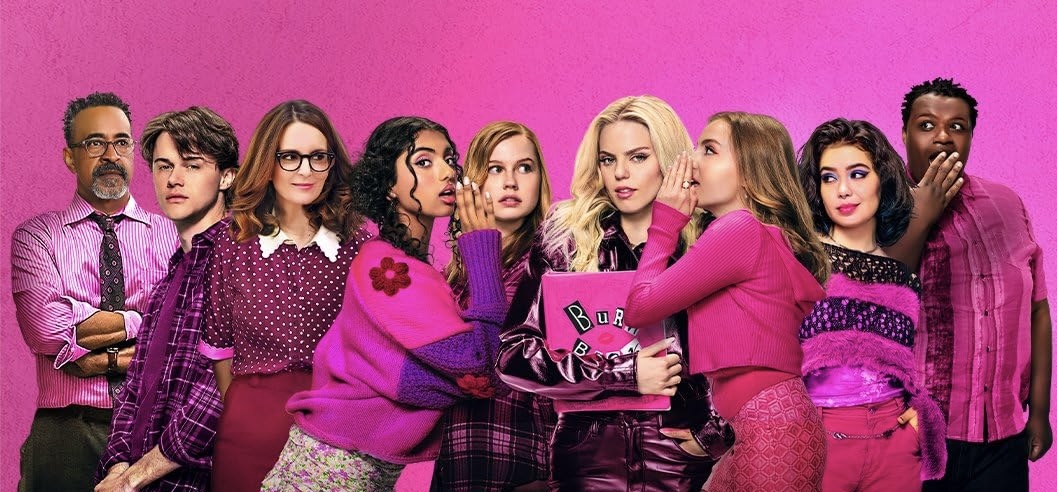Barbie, a movie spectacle anticipated by many, was released in theaters on July 21st.
This movie shook the world not only with its incredible casting, but also its emotional moments
and political statements.
This was director Greta Gerwig’s fourth film since her 2008 debut Nights and Weekends. Her film Lady Bird (2017), and her remake of Little Women (2019) were also huge hits. Gerwig’s masterful movies all come with slices of comedy alongside raw, heartfelt elements, and Barbie is no different.
Barbie is a film focused on Stereotypical Barbie, played by Margot Robbie, who is also known for her portrayal in other films, such as Once Upon a Time in Hollywood (2019) and her character of Harley Quinn in the DC universe.
This movie begins by following Stereotypical Barbie in a day of her life in Barbie-Land. It is here where we see the many different variants of Barbie, such as President Barbie, played by Issa Rae, and Weird Barbie, played by Kate McKinnon.
When Stereotypical Barbie realizes something is wrong with her, such as her flat feet, and “irrepressible thoughts of death,” she goes to see Weird Barbie, in hopes she has an answer. She informs her that she has to travel to the real world to find the girl playing with her. She also explains that a girl and her doll are connected; if the girl is having bad thoughts, her Barbie will as well.
As Stereotypical Barbie begins her journey to the Real World, Ken (played by Ryan Gosling), tags along. Upon arrival, Barbie finds the world very male-oriented, while she expected quite the opposite. Barbie-Land is female-dominated, with all high class citizens, such as government officials, or scientists, being women. Barbie, still shell-shocked at this discovery, is quite contrasting to Kens interest in the Patriarchy. Ken’s curiosity gets the best of him, and he reads all about wars, and “men on horses.”
As Ken dives deeper into the realm of misogyny, Barbie begins to feel less and less like a Barbie, and more human-esc as her uncovering of the real world defies her core values. After a series of mishaps, Barbie finds the one who is playing with her. Barbie and her girl, Sasha, (who is played by Ariana Greenblatt,) and her mother, Gloria, (played by America Ferrera,) travel to Barbie-land; assured Ken is safe, or has found his way home.
Once they arrive, they find that not only has Ken found his way back, but has turned Barbie-Land into a city built on sexism and male superiority. As the three women begin to explore this altered version of Barbie-Land, they run into Ken. Barbie expresses her frustration with his beliefs, but her annoyance soon turns to anger, once she has seen all the Kens have turned their Barbie Dream Houses into a “Mojo Dojo Casa House.” Along with the Kens gaining power, all the Barbies seem to be acting under the Kens commands, as if they could not think for themselves.
Stereotypical Barbie breaks down, as she tells Sasha all she ever wanted was for things to go back to how they were. Just as Gloria and her daughter are about to travel back to the real world, Sasha convinces her mother to stay, in an attempt to restore Barbie-Land to its original state. Once again, Barbie seeks help from Weird Barbie. Weird Barbie is also trying to help the other Barbies. She tells Barbie, Gloria, and Sophia that they will not snap out of it. Stereotypical Barbie bursts out in tears, still distraught over the state of her home, and her friends. Out of frustration, Gloria begins a speech about the immense troubles and expectations of being a woman.
After Gloria’s speech, the Barbies, previously unable to think for themselves, regain consciousness. Now that all the Barbies are free-thinking, they formulate a plan to reinstate Barbie-Land to its original state. Their plan allows different Barbies to still pretend to still be under Ken’s influence and distract one of the many Kens, so they use the Barbies as distractions, to take back the other Barbies. After continuing to distract the Kens by exploiting their weaknesses, allowing them to mansplain movies and sports. They also use the Kens jealousy against one another to cause the Kens to lose concentration of their goal, which is to make Barbie-Land “Kendom.” After restoring Barbie-Land, the Barbies rejoice, and the Kens realize their value is not determined by Barbie, that they are not “just Ken.”
Despite criticisms, this film highlights harmful stereotypes, prevalent being toxic masculinity. One of Ken’s main traits in the film supports this: Ken’s belief he is nothing without Barbie. This movie brings to light the harmful ways we expect men to behave: without validation, and support. Ken’s feelings of worthlessness because of his lack of a purpose/job, (to be with Barbie,) he feels he doesn’t have the skill or ability to do anything he was intended. Many thought of Ken’s clinginess as a comedic quirk, but his thought processes shows even further how this film is not about the hating or dehumanizing of men, but rather to empower women, and allow men have feelings or thoughts they may have been taught to not have.
After Barbie’s release, there were many mixed reviews. Some found it to be ‘feminist propaganda’ and an attempt to brainwash kids into a certain way of thinking, ignoring the film’s PG-13 rating. Yet although many disliked, or even hated this film, others found it essential and groundbreaking. Instead of beating around the bush with its message, as is the case for many movies, Barbie is straightforward and blunt, making the message bold and easier to understand, especially for those who cannot naturally relate to women’s struggles. This film’s central purpose is not to exclude or minimize the problems of men, but to empower women. Greta Gerwig’s ability to make such a powerful movie, not only discussing the struggles of women, but men. Lots of films struggle with the idea of lots of substance, themes and important topics, but not enough attention to detail. This film has great cinematography which changes gradually as Barbie adjusts to the real world. This shows the incredible directing abilities of Greta Gerwig, and how her technical skills help the film to move smoothly.
Though Barbie has many comedic moments, or scenes that may seem silly, it remains an emotional and powerful film. Gerwig uses these sighs of releif in the film to give us breathing room. Handling a topic so sensitive, and difficult can be overwhelming if not done correctly. Greta using an incredible screen play, and a great cast, makes this film feel less heavy. Her immense talent is not unexpected, as her previous coming-of-age films are already classics in the eyes of many. The unexpectedness of this film, was that it was along with her others, a coming-of-age film. It explores many themes of womanhood, and the struggles of finding yourself. This is shown when Stereotypical Barbie contemplates going to the real world, permanently, and she is told to reflect. On all the things she has seen, and experienced. She eventually decides to move on from Barbie-land, despite her time in the real world consisted of her being objectified. This simple decision contrasts the beginning of the film, when she doesn’t even think about the options, and says she wants to stay in Barbie-land. Her character change after being exposed to the reality of the world, and how Barbie has really affected girls, shows her resistance to ignorance. Instead of staying in the dark, and trying to live her previous life, she moves on, because of her loss of innocence.
Barbie is available now on streaming services like Amazon Prime and Vudu.

















